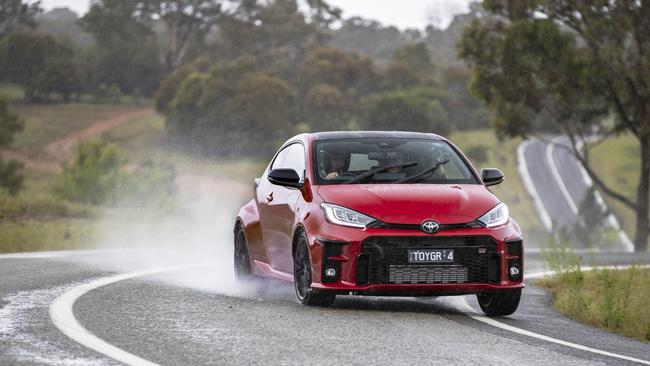Toyota GR Yaris Rallye: a little car with a racer’s heart
I really didn’t want to drive the new Toyota Yaris. But to understand this car you must delve into the rules of international rallying.

I really didn’t want to drive the new Toyota Yaris. I’ve always thought of the Yaris as a car you buy because you think the Honda Jazz is a bit too racy. And when I learnt that the model I would test had a three-cylinder engine, I very nearly called Toyota to cancel.
That, however, would have been a big mistake because what turned up was the GR model, which means that, actually, it isn’t really a Yaris at all. To understand this car you must delve into the rules of international rallying. If a carmaker wanted to enter a car into a rally in the ’80s, it had to produce 5000 roadgoing versions, for ordinary people; this is why we ended up with cars like the Lancia Delta Integrale. Today they must produce 25,000 versions of a car entered in a world championship rally. Which is why the sport is now full of dreary Hyundais and VW Polos, and no one watches it.
Toyota has plainly decided to do something about that. So instead of putting stickers and some knobbly tyres on an ordinary Yaris, it has built an all-new version that shares almost no components with its brother. The engine in both the standard GR and the Rallye special edition I tested is a three-cylinder 1.6-litre turbo, which creates a deep, offbeat thrum, as if you’re sharing the car with a snoring dog. It’s tremendous. And when you put your foot down at low speed in a high gear, it’s like you’ve gently woken the dog. There’s a stirring. A sense of enormous power coming to life. The engine may by tiny, but it produces 194kW, which, in a car that weighs about as much as a match, means some serious get up and go.
To make sure none of the power is wasted, there’s a four-wheel-drive system that moves the oomph to whichever wheel is best able to handle it at any given moment. There’s even a small readout on the dash to show you what’s going where – but if you are going quickly enough for the system to be working, trust me, you won’t have time to look at the dash.
This is a car that made me laugh out loud. I took it into my fields one morning and made a terrible mess, but I didn’t care because it was a complete riot. And once I’d got the hang of how it handled and how the system that enables you to choose between Track, Sport or Normal made no discernible difference, I went onto the roads, which were made from sheet ice. And it was a riot there, too. When you feel the traction is gone in a normal car, there’s always a hair-raising moment when you think, “Crikey, I hope I can rescue this situation,” but in the Rallye, with its front and rear limited-slip differentials, you just think, “Oh goody. This’ll be fun.” It’s uncannily easy to control and because of that you feel like a driving god. Like you could win a rally. This is one of the most enjoyable and thrilling cars I’ve ever driven. It’s like a puppy dog version of the Nissan GT-R and I adored it.
Drawbacks? Very few. The interior is a bit Yarisish and because the sat-nav screen sits on top of the dash there’s an almighty blind spot. Oh, and you do sit quite high up, but that’s because rallyists like it that way. There are other examples of this thinking, too. Instead of an electric handbrake, you get a proper lever. The huge front seats mean there’s no legroom in the back, and because Toyota’s aerodynamicists wanted a sloping roof so they could put a rear wing in the airflow, there’s no headroom either.
In other ways, there’s no evidence at all that it’s a rally car. It’s got sensors that tug at the wheel when you stray out of lane and all the other appurtenances of modern living. Perhaps the most incredible thing is the way that such a sport-focused car isn’t particularly uncomfortable. It doesn’t glide but it doesn’t jar either. I suspect this may have something to do with the fact that there are 4175 weld points in the GR Yaris, 259 more than in the normal car, along with 35m of structural adhesive. The body is as rigid as a cathedral and that gives a sense of refinement.
I’ve saved the best bit till last, though. Prices for a standard GR start at less than $50,000. I can think of nothing, apart from this newspaper and a Maccas Happy Meal, that represents such good value. And that truly makes this car perfectly in tune with the times.
TOYOTA GR YARIS RALLYE
ENGINE: 1.6-litre three-cylinder turbo (194kW/370Nm). Average fuel 7.6 litres per 100km TRANSMISSION: Six-speed manual all-wheel-drive
PRICE: Rallye as tested $54,500 (due in Australia in April); standard GR $49,500
RATING: Five out of five




To join the conversation, please log in. Don't have an account? Register
Join the conversation, you are commenting as Logout